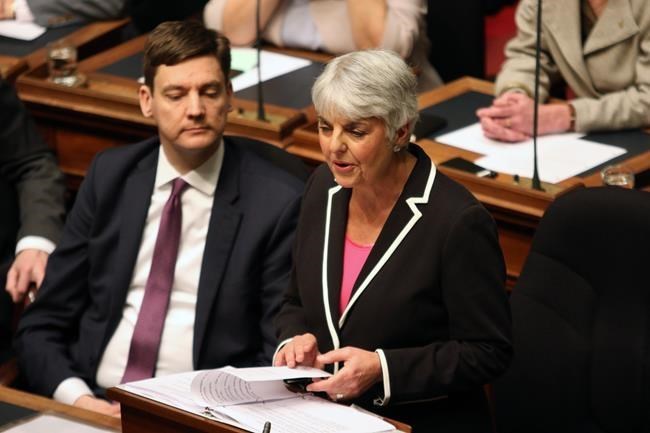 It turns out the NDP government’s first full budget had a delay fuse in it.
It turns out the NDP government’s first full budget had a delay fuse in it.
The tax-and-spending plan was cautiously well received for the first few days, as people calculated all the goodness to flow from “historic investments in child care and affordable housing that will be felt for generations.”
Then the full import of the speculation tax and the employer health tax sank in. Boom!
In the space of a week, headlines switched from “Relief for lower income families” to “NDP destroying B.C. again.”
With the budget now 25 days old, resentment and consternation about the two big new tax grabs are gaining momentum. There’s even a secessionist movement, as West Kelowna and the Nanaimo region want out of the speculator free-fire zones created in the budget.
Finance Minister Carole James has acknowledged there’s room for some adjustments.
The question is whether the unrest on the part of some homeowners and virtually all employers will get to the point of forcing something closer to capitulation, rather than just a few tweaks.
Last time the NDP went through this, 25 years ago, it took just a week for them to retreat. Then-finance minister Glen Clark introduced a budget with big tax hikes all around, including a new surtax on luxury homes (over $500,000!).
“We know that tax increases are unpopular,” Clark said in his budget speech. But he imposed them anyway.
An immediate reaction from homeowners prompted then-premier Mike Harcourt to retool the budget on the fly. Seven days after it was announced, the surtax was cancelled.
The retreat dialed the outrage down from boil to simmer and they carried on.
Today’s NDP government is still standing its ground on the employer health tax and the speculation tax, but with much less certainty than on budget day.
A week’s worth of badgering in the legislature last week produced these definitive conclusions:
• James: “The specifics will come. As I’ve said all along, details will come. We are listening. We are working to ensure that the [speculation] tax is implemented correctly. We are going to make sure that the issues are addressed. More details will come later … Stay tuned.”
• Premier John Horgan: “We’re listening to British Columbians, and we’re going to bring forward solutions this fall. That’s what we said we’re going to do. That’s what we’re going to do.”
In the meantime, they’re relying on a favourable poll taken before the fuse was lit, and consoling themselves by reading supportive letters into the record. A sizable number of people are unmoved by the plight of B.C. residents with vacation homes facing thousands of dollars in new taxes.
Off-camera, there’s a lot of number-crunching going on trying to establish which tax — employer health or speculation — is the least popular, and what’s the most popular move to make, without throwing the entire budget out of whack.
It looks like the speculation tax will get the most attention. The government gave a misleading impression of the impact it will have on B.C. taxpayers (voters). That will just fester if not addressed.
The revenue figures are smaller, so the NDP can afford to relent a little.
Although Green Party Leader Andrew Weaver — whose reaction is more important than most — has denounced both taxes, he’s been more vehement about the speculation than the employer health tax.
And B.C. citizens with vacation homes have almost nothing to do with the affordable-housing crisis, so the government wouldn’t lose much ground on the primary problem if it eased off.
Fine-tuning the definition of “speculator” so B.C. residents can escape it would calm things down a bit.
The employer health tax will bring in $1.8 billion next year, so any adjustments will cost the treasury much more. The double year of taxation next year — when many businesses will pay both their employees’ MSP and the new tax — is clumsy and indefensible.
But the philosophy behind that tax in general is more solid. Somebody has to pay to make up for the billions lost with the abolition of MSP premiums. It might as well be businesses — and eventually their customers.



